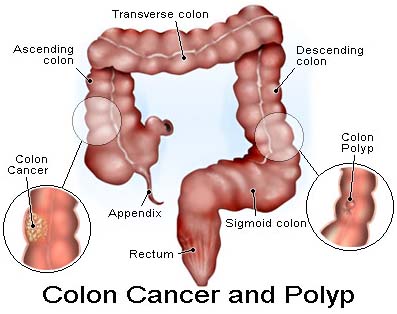Overview
What is cancer?
Cancer is a group of more than 100 different diseases. They affect the body's basic unit, the cell. Cancer occurs when cells become abnormal and divide without control or order. Like all other organs of the body, the colon and rectum are made up of many types of cells. Normally, cells divide to produce more cells only when the body needs them. This orderly process helps keep us healthy.
If cells keep dividing when new cells are not needed, a mass of tissue forms. This mass of extra tissue, called a growth or tumor, can be benign or malignant.
Benign tumors are not cancer. They can usually be removed and, in most cases, they do not come back. Most important, cells from benign tumors do not spread to other parts of the body. Benign tumors are rarely a threat to life.

There are three ways that cancer spreads in the body.
The three ways that cancer spreads in the body are: -
- Through tissue. Cancer invades the surrounding normal tissue.
- Through the lymph system. Cancer invades the lymph system and travels through the lymph vessels to other places in the body.
- Through the blood. Cancer invades the veins and capillaries and travels through the blood to other places in the body.
There are different types of treatment for patients with colon cancer.
Different types of treatment are available for patients with colon cancer. Some treatments are standard (the currently used treatment), and some are being tested in clinical trials. A treatment clinical trial is a research study meant to help improve current treatments or obtain information on new treatments for patients with cancer. When clinical trials show that a new treatment is better than the standard treatment, the new treatment may become the standard treatment. Patients may want to think about taking part in a clinical trial. Some clinical trials are open only to patients who have not started treatment.
Surgery
Surgery (removing the cancer in an operation) is the most common treatment for all stages of colon cancer. A doctor may remove the cancer using one of the following types of surgery: -- Local excision: - If the cancer is found at a very early stage, the doctor may remove it without cutting through the abdominal wall. Instead, the doctor may put a tube through the rectum into the colon and cut the cancer out. This is called a local excision. If the cancer is found in a polyp (a small bulging piece of tissue), the operation is called a polypectomy.
- Resection: - If the cancer is larger, the doctor will perform a partial colectomy (removing the cancer and a small amount of healthy tissue around it). The doctor may then perform an anastomosis (sewing the healthy parts of the colon together). The doctor will also usually remove lymph nodes near the colon and examine them under a microscope to see whether they contain cancer.
For more information, medical assessment and medical quote
as email attachment to
Email : - info@wecareindia.com
Contact Center Tel. (+91) 9029304141 (10 am. To 8 pm. IST)
(Only for international patients seeking treatment in India)










